- Submissions

Full Text
COJ Nursing & Healthcare
A Call to Intellectual Action and Solidarity in Response to Our Presidential Call to Move to Stage 4 of Lockdown which Seeks to Place our Students and Teaching Workers back to Teaching and Learning without a Strategy on how to. We already have Health Care Workers on the Margins Highly Exposed to the Viciousness of the Covid19 Pandemic, why Add more Workers into Risk, when it is still not Clear how Workplaces are Prepared to be Places of Safety against the Spread of the Covid19 Pandemic for our Workers on the Frontline? Reorganize Workplaces First
FikileVilakazi*
Gender Studies, South Africa
*Corresponding author: Fikile Vilakazi, Gender Studies, School of Social Sciences, Lecturer in Political Science and Public Policy, International and Public Affairs Cluster, South Africa
Submission: May 27, 2020;Published: September 11 2020
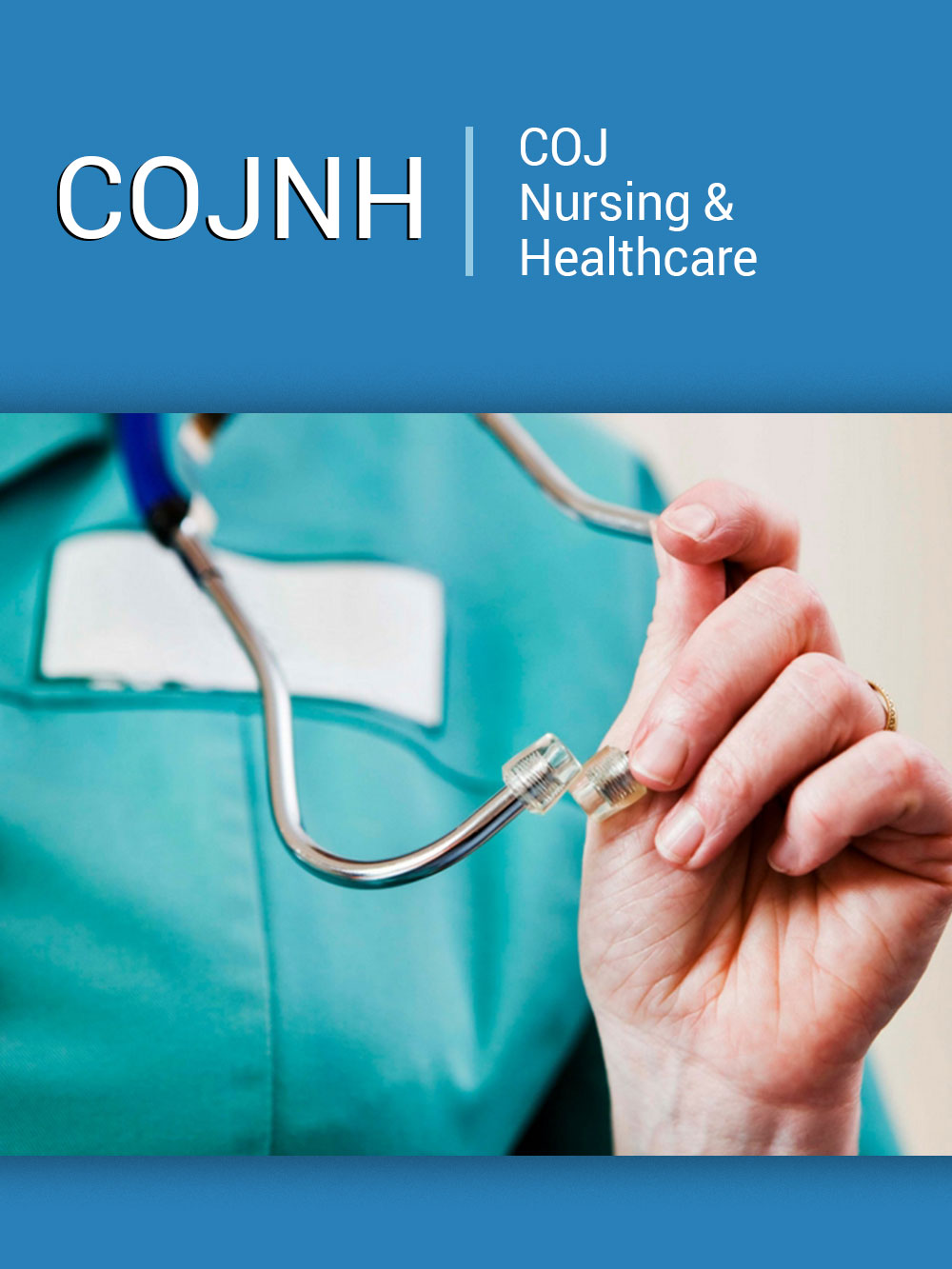
ISSN: 2577-2007Volume6 Issue4
Abstract
Imagining a possible social pedagogical approach to healthcare, Teaching and learning in community as an emergency response that brings healthcare, teaching and learning into our shelter and place in community as a measure to arrest the spread of Covid 19. This is a travelling virus, if people do not travel, the virus does not travel! Stay in shelter and place till then! Let us reorganize ourselves and remember that relationships, love, care, solidarity, respect, honesty, directness, integrity, bonding, is not locked down. Let us continue socializing as we keep physical distancing…! In this way, we can keep our social bonds intact! This is our power and our center for holding our possible world post the COVID 19 pandemic. We applaud the Black Academic Caucus for leading the thinking work of another world possible in our lives in community. The thinking work concerned academic in South Africa that continues to move that thinking forward is highly commendable and appreciated. Lastly, I would like to express my sincere gratitude for the thinking and doing space that has been created by the COVID19 People’s Assembly in South Africa as we collectively seek emergency responses for curbing the spread of COVID19. We are engaged in act of thinking work, teaching work and learning that is deeply embedded in socio-economic and political engagements of our time as presented by the pandemic crisis. I see the Coalition space as a model that I imagine can be a form of teaching and learning in community. This is what I have been doing since the outbreak of the COVID19 pandemic. I have been doing mu teaching work through the work of the Coalition in ways that I have brought in some of my postgraduate Masters and PhD students that I supervise into the space to enable them to learn in action as they also become part of a collective framing, imagining emergency responses. I therefore see this is a perfect example of what a social pedagogical teaching and learning in community approach can look like.
Keywords: Imagining; Social pedagogical approach; Curriculum transformation; Healthcare transformation; COVID19 Pandemic; Black Academic Caucus
Introduction
It is more or less a month since the violent outbreak of the Corona Virus pandemic which is currently framed as originating from the villages of Wuhan in China sometime early February 2020. Although this remains disputable in that China began at the early days of the outbreak to give signals that the virus may have actually originated from the United States and brought in to China via a group of soldiers that were deployed for a military mission to China sometime late in 2019 and early 2020. A position that President Donald Trump vehemently disputes on the public domain currently. So, this dispute about the origin of the virus between China and the US should not be left unchallenged.
It requires an urgent critical angle of analysis and engaging in particularly because of the already observed ongoing economic wars between the two economic superpowers of the 21st century in the global economy. Figure 1 & 2 demonstrates US and China’s broken economic relationship journey. This is an intellectual responsibility that I personally would imagine should be assigned urgently to current critical pedagogical engagements within humanities, social sciences, health sciences, economic sciences and digital sciences amongst others to immediately start questioning through our critical scholarship and theoretical traditions. In my view, this is an urgent intellectual commitment that must be undertaken by various stakeholders of the intellectual community of students, teaching and learning workers, teaching and learning administrators, parents, community and activist formations, teaching and learning policy makers and governments as a collective.
Figure 1: China trade with the US.
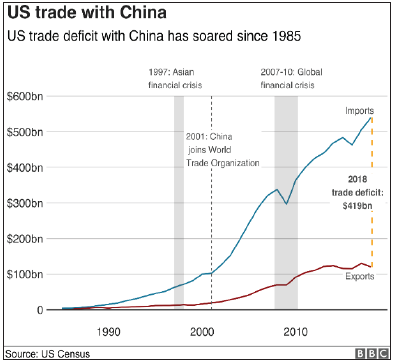
Figure 2: Trade war illustration between China and the US.
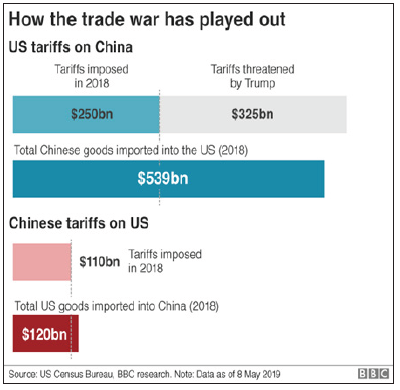
Bill Gates, Trevor Noah and Covid 19
This collective critical intellectual analysis should not take lightly the fact that Bill Gates, has already given signals on the public domain that he had already warned governments about putting in place measures to curb the outbreak of COVID 19 which he had already predicted to hit anytime soon in ways that are far harder, harsher and deeper than we have ever experienced as the global community in other viral outbreaks like Ebola, SARS and so on. I know this through recent Bill Gates conversations with our public comedian Trevor Noah, Who is constantly engaged in exposing deeply embedded political and socio-economic realities through his comedy and currently doing so as host of the daily show, A popular comic programme in the US that transmits and enables political debate and intellectual engagement through comedy. We must ask ourselves, How did Bill Gates know all of this when it seems most governments have been taken by surprise about the COVID 19 outbreak and are as a result battling to hold together their citizenry given an absence of a possible vaccine to curb the spread of COVID 19 (Figure 3). The global economic recession is already predicted to be far deeper than the one of the 2009. The global political economies are shaken fundamentally by this outbreak.
Figure 3: Trevor Noah Interview with Bill Gates.

How is this possible? How did Bill Gates know all of this when global governments did not? We must be vigilant in our critical inquiry Moreso because Bill Gates holds the economic fabric of the global economic and digital infrastructure. He was recently declared the richest man in the world by the Forbes Annual list of billionaires in the world and the work of his foundation, the Bill and Melinda Gates Foundation, is largely involved in global health interventions and he owns Microsoft, a digital network that holds all of us together now as the global community in ways that violently and forcefully hold us hostage through virtual ways of being whilst the most marginalized of our economies are subjected to deepened levels of desperation and deprivation by the outbreak of COVID 19. We must ask ourselves through our collective intellectual traditions and critical inquiries in our engaged activist scholarship, how is this possible, that one super rich white man from the US in the world can know and warn about the pandemic when global governments did not see this come? Follow Bill Gates Interview with Trevor Noah below (Figure 4).
Figure 4 Young black women and men bodies under violent punitive militarization during lockdown whilst in protest against harsh living conditions during the COVID 19 lockdown in Cape Town, South Africa.

Covid19 Outbreak, Social Inequality and Equity
The virus is coined as COVID19 and is said to be transmittable largely through droplets between and amongst humans in the form of sneezing, Coughing and touching oneself and each other in certain ways through our hands personally and collectively amongst others. It is argued that the use of materials like tissues, Cloth and hands whilst excreting droplets from our bodies are suspect to enabling the transmission of the virus which is seen as largely transferable through distance and travelling. As a result, the dire consequences of the COVID 19 outbreak have been experienced in the last month since the outbreak, in multiple forms that deepen socio-economic and political inequalities and inequities that are directed in violent ways through punitive militarization of our bodies and livelihoods, increased exposure to global displacement of citizens in various parts of the globe, hunger, starvation, desperation, destitution and a deep sense of fear, confusion, uncertainty and despair particularly amongst our elderly, our women, our students, our precarious workers, our domestic workers and mostly our essential workers in (health, food, transport, energy, water amongst others) sectors of the economy who are at the frontline of keeping our economies alive as the pandemic unfolds, and most of whom are black, African, migrants and working class.
The Faces, Bodies and Lives of Black, Women, Health Working Class and Students at the Heart of Punitive Militarized Covid19 Violence and Frontline Exposure
See below some of the images indicating these experiences as observed on the public domain as the virus unfolds.
Healthcare workers on the frontline and on the margins are already suffering, Covid19+ and at High Risk of Possibly Dying, why Expose more Workers into Danger without a Clear Strategy on how Workplaces have been prepared to Mitigate these Risks? Comrade President and Fellow Cabinet prepare Workplaces First, then Deploy Workers. We have a Responsibility to Protect and Defend our Workers
See how healthcare workers on the margins are already suffering, becoming COVID19+ and possibly at risk of dying from COVID19 related complications, yet the President and the cabinet have decided to expose and place more workers on the margins at risk without a clear plan on how workplaces have been prepared to absorb and arrest the spread of the COVID19 pandemic through work places. We need our workers safe, intact and ready to usher us into a world beyond COVID19, depending on how we respond and act, during this Covid 19 crisis, we may lose a resilient, dedicated and determined human capital of our country to Covid 19 related complications and possibly deaths. Our healthcare workers comrades President have already shown us that they are willing to honour their call of duty to save lives and stand in the gap, be on the frontline against all odds in order to save lives of our own people, even if it means exposing and losing their own. We truly appreciate this level of determination and patriotism that has been demonstrated in the last month since the outbreak of the COVID19 pandemic by our healthcare workers. We salute them and owe this category of our citizens a right to work safely, especially comrade President because they have not refused to work and take the frontline since the beginning. On the contrary, they continue to rise on their call to duty daily since this vicious outbreak. I call on you comrade President and the cabinet to reorganise your priorities in this regard, by preparing workplaces first, and turn them into safe spaces of work, before deploying more workers from the margins, the majority of whom are black women, working class and poor. Early days after the onset of the COVID19 pandemic (Figure 5).
Figure 5 Healthcare workers, nurse and doctors are placed at high risk as they respond on the calling to save live without sufficient Personal Protective Equipment’s (PPEs) as promised by government, yet not adequately delivered.
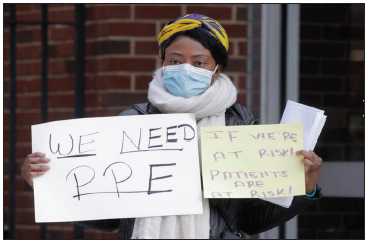
The Department of Health said it is concerned with the number of doctors and nurses who have been infected with the coronavirus. Health workers are often exposed as they are in the front line of the battle of the virus. Eleven medical doctors, one nurse and one neurophysicist have tested positive for the virus. “All these health workers are in a good medical condition with most of them having mild or no symptom [1].
Whilst we appreciate the leadership of the Health Minister Zweli Mkhize since the outbreak of the pandemic, we equally remain deeply concerned about the level of exposure, risk and rates of infections that are experienced by some of our health workers on the frontline and on the margins of society. We therefore firmly believe that it would be irresponsible of us to continue exposing our workers to this vicious COVID19 pandemic without thoroughly preparing our workspaces as safe space of work. We are now even more concerned about your decision comrade President to deploy teaching workers, our learners in basic education and our students in post school education back to institutions of teaching and learning, without a clear plan on what has been done to prepare these teaching and learning workspaces in terms of safety (Figure 6).
Figure 6 Health workers on the frontline and margins of the COVID19 pandemic.

Until that is done comrade President, we do not think that our country is ready to return our teaching workers and students back to centers and institutions of teaching and learning. We see how a vast majority of our citizens will be further exposed to the violence, risk and exposure of the COVID19 crisis as it continues to unfold. These will include our children and youth who remain our future and carry our possibilities for another world possible. We therefore do not think that we are ready for stage 4 of lockdown comrade President (Figure 7). Let us protect and defend our citizens’ and rather use this next couple of days to urgently deploy resources in ways that increase Personal Protective Equipment (PPEs) and design a comprehensive worker protective plan which includes urgent reimaging and reorganising how safe workplaces should look like during this COVID 19 pandemic. I am confident comrade President that our unions, fellow workers, parents and students are ready to provide you and all of us with ideas on how this could be reimagined [2].
Figure 7 Frontline healthcare worker on duty.

Let us rather call an urgent citizen’s caucus or dialogue that includes these key voices to frame collectively on how we can reorganise our workspaces (e.g. health & education) into safety whilst in community as the pandemic unfolds. There are various possibilities that lie ahead in this regard including deploying and resourcing home based care facilities and infrastructure to assist us to carry this health care burden collectively with dignity through our families, neighbours and our loved ones within communities in a safely a manner as possible in our quest to save lives and mitigate risk for all of us (Figure 8).
Figure 8 Status of COVID19 just as the President was pronouncing a move towards stage 4 of lockdown.

Imagining a New World System as Emerging at the Center of Covid19 Outbreak
Could this be an emergence of a new world system that we have been waiting for? A system that was predicted by the late Immanuel Wallerstein as a possible collapse of the World Capitalist order. Wallerstein examines the changes in Hegemonic Cycles, perceived as mechanisms that, during normal times, bring capitalism back to equilibrium. However, during the coming three to four decades equilibrium will no longer be attainable. Wallerstein diagnoses exhaustion of possibilities to increase capital accumulation and therefore predicts capitalism’s collapse in the near future (Figure 9). So, I ask a question then, could this be a moment of imagining another world possible? Could this be an opportunity to imagine? I ask these questions because I see that whilst we grapple the dire effects of the pandemic, we are also rebuilding stronger networks of communities that have been fragmented by various systems of segregation over time like the slave trade, global colonialism and apartheid amongst others [3].
Figure 9 Statistical mapping of current status of the COVID19 outbreak on 24 April 2020.
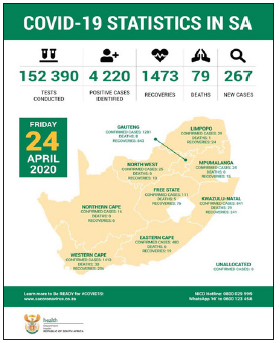
Systems that were rooted in heightened religious fundamentalisms, conservatisms, punitive militarization of our bodies and communities through wars, conflicts and structural adjustments of our livelihoods globally. On a positive note, I see how this COVID 19 pandemic presents us with opportunities to reorganize ourselves into global communities of care, love, sharing, collective being, transparency, generosity, humility and being social. It is reminding us at the core of our being of what it means to be social through collective ways of care, love, sharing, generosity, humility and giving. It is a moment that has reminded us about what it means to be home, to be family, to be a neighbour, to be a community that takes care of itself and each other in ways that hold together in collective forms of being as embedded in our philosophical traditions of Ubuntu, Ujaama and Botho as known in the context of the African philosophical ways of being [4].
A Call to Action and Solidarity
These are the questions that I call on us to reflect on through our various intellectual traditions and philosophies in our scholarships of humanities, social sciences, health sciences, economic sciences and digital sciences amongst others as I see these as essential intellectual sciences that are required to do thinking work, analysis work in ways that assist us to find solutions that can take us into a desired world and ways of being in community during the COVID 19 crisis and beyond (Figure 10). We can no longer afford to be silent in the framing of emergency responses that provide a nuanced intellectual response that is grounded on multiple analyses that is biomedical first and for most and more. We need an added layer of analysis and thinking work that emanates from indigenous, social, economic and political in our framing [5]. Humanities and social sciences that include studies and thinking in sociology, anthropology, political economy, gender, feminisms, conflict and peace studies, migration, decoloniality amongst others can move us into that direction in my view. I close by cautioning that as we do that thinking work, let us do so in ways that do not put the lives of our students and teaching workers at the heart of the COVID 19 crisis. This pandemic is violent, vicious and pervasive. It is outrageous. I ask our government to be cautious in its decision and reconsider the returning of our students and teaching workers into danger. We have already lost so many lives.
Figure 10 Breakdown of COVID19 statistics by categories of gender and age amongst others.
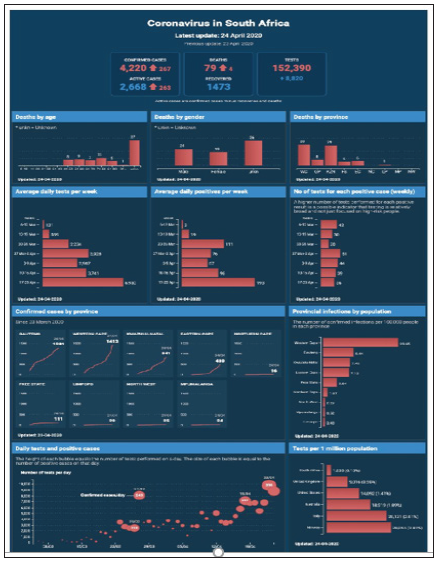
Our children and young intellectuals are our future intellectual capital, an assert that we need to move us into a possible world beyond COVID 19 crisis. We must therefore protect our children and young intellectuals against all odds from the viciousness and the violences of the COVID 19 pandemic and related systems and imagined world orders. I therefore suggest that we keep our learners and our students safe in place and shelter whilst we use this time to reflect on how we can best encourage continued teaching and learning in community in ways that enable us as a nation to rebuild our social fabric that has been eroded over time by forced structural adjustments since 1945 and related violences emanating from that era (Figure 11).
Figure 11: Lockdown stages as presented by the President Cyril Ramaphosa on the 24th of April 2020.
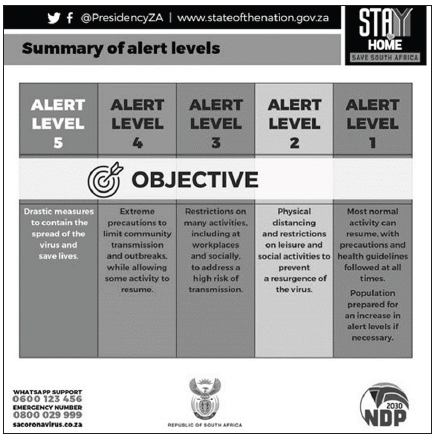
Figure 11:
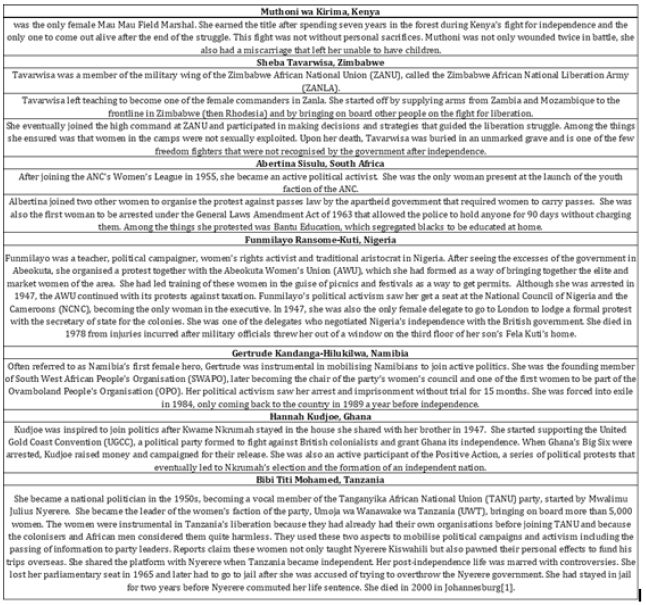
Let us rather use this moment, not to repeat the mistakes of the past by reimaging our relationship with global financial institutions like the International Monetary Fund, the World Bank, and the World Trade Organization amongst many others. Let us avoid a mistake that comrade Frantz Fanon constantly reminds us about in our scholarship, to forget our intellectual responsibility to shape, to reorganize, and to reimagine ways of moving ourselves from the violences of the past. This calls on us to reimagine a world that is possible without the International Monetary Fund and the World Bank amongst others. What we should rather do is to talk about how the BRICS Bank, the African Development Bank, the African Banks, the Latin American Banks, the Caribbean Banks, the Banks of the Pacific Islands, the Peoples economy and so on can play that role that is envisaged and assigned to the IMF and the World Bank. It is hoped that as we reimagine this, these new financial institutional arrangements and reorganization will express themselves and begin and urgent task of distributing financial resources in ways that seek to build communities, stronger relationships and bonds in communities that we require to usher us into a possible world beyond COVID 19 [6]. If we do this fellow comrades and colleagues, we will emerge out of COVID 19 crisis with stronger communities, revitalized social institutions, collective networks and a stronger social fabric that will hold us intact for many generations to come. This we owe to ourselves, our children and young intellectuals of the world beyond COVID 19.
My intellectual reading tells me that we have an opportunity to take ourselves into that possible world under the decisive leadership of our comrade Tedros Adhanom at the World Health Organization. He is proving us with a kind of leadership that we need in our lifetime in a moment as COVID 19 crisis. Let us support comrade Tedros Adhanom. I call on other international institutions like the United Nations Human Rights Council (UNHRC), the United Nations Educational, Scientific and Cultural Organization (UNESCO) to join hands with comrade Tedros Adhanom in terms of how this can be done collectively to take us into a world that is possible post COVID 19 (Figure 12). This collective engagement between these institutions is urgent and essential and must happen immediately in the next coming week to begin a process of reimagining and reorganizing the world into a place of possibilities beyond COVID 19 pandemic.
Figure 12: A day of prayer for South Africa during lockdown-Gogo Solomon Shabangu, 26 March 2020.
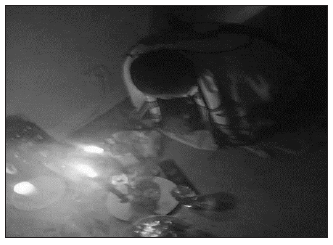
The withdrawal of the financial resources of the United States from funding the World Health Organization is a decision by the US that we must welcome as an act of power shift. Power is reorganizing itself in our favour [7]. We need to use this moment, now, the next couple of days, reorganizing these international institutions in ways that build on a Global People’s economy, that is created and grounded on values and principles of collective sharing centered in a place of deep love, care, and an intention to build rather than fragment our international communities.
In doing this, comrades, I ask that we also reimagine the manner in which global financial institutions like the International Monetary Fund, the World Bank, the World Trade Organization and others can be reorganize in ways that are not driven from a place that sustains greedy, white monopoly patriarchal capital who find stimulation from ways of working that use and abuse bodies of our people on the ground for their labour most of whom are our global South, African, black, women, working class comrades. We have an opportunity to stop this manner of violence now and for all. We have that Power as expressed in our beautiful rage (Figure 13). The beautiful calming decisive rage of comrade Tedros Adhanom as demonstrated in the last couple of weeks is a power and base from which we can all organize ourselves from. This is how we are going to fight the spread and arrest the the COVID 19 pandemic and its related global economic and social consequences, depending on how we respond in the next couple of days. I call for urgent solidarity between international institutions to begin to imagine emergency responses during this global crisis in ways that can usher into an era that does not rely on the current organization of the IMF, World Bank and the World Trade Organization [8].
Figure 13: A day of prayer for South Africa-Gogo Phakathi, 26 March 2020.

The ways of working of these global financial institutions need to be reorganized urgently in the next couple of days in ways that are grounded on the values and principles of collective building and not fragmenting our communities. This means investing in localized collective people’s economies on the ground in ways that enable a collective sharing and distribution of capital on the ground. It also means investing in the rebuilding of our health systems, education systems, social security systems, knowledge systems, economic systems, social systems, social bonds, social networks that work together towards that vision. Our people are ready to support this vision on the ground and moreso during COVID 19 crisis (Figure 14).
Figure 14: Black Academic Caucus at UCT proposed scenarios for post school education during the COVID19 pandemic outbreak.
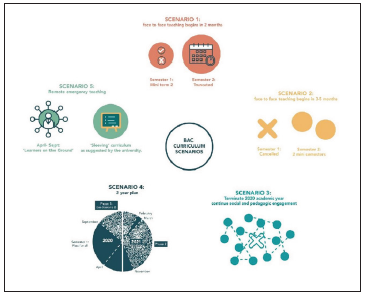
If we do this comrades and colleagues, I foresee that this may be the last of these kinds of pandemics that we will see in our lifetime for a very long time. This is one thing that I agree upon with our number one richest man on earth, Bill Gates predictions. Depending on how we respond now during this crisis, we may never see a pandemic of this nature again at least for the next millennium to come. My reading comrades and colleagues is that this is possible. I therefore call on our national government here at home, the Ministry of Education, our Vice Chancellors, University South Africa and the entire student body to rethink a decision that moves leaners, students and teaching workers into stage 4 of COVID 19 in South Africa as illustrated below [9].
Figure 15: Proposed National Plan for Post School Education in South Africa.
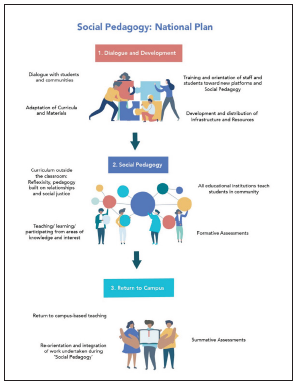
This is a dangerous move that we may regret for many more years to come. I therefore reiterate a broader call that was developed by the Post Education Working Group of the People’s Coalition on COVID 19 and the National Discussion Team of Concerned Academics of South Africa in our call for an immediate move into a social pedagogical approach to our teaching in community and place during this time of the Corona Virus pandemic. In an institution like ours that is committed to building African scholarship that is driven from a place of intellectual excellence and greatness, the University of KwaZulu Natal, we already have an amazing mechanism and portfolio that we call ‘community engagement” which we can immediately utilize to place our teaching and learning in community as the COVID19 crisis unfolds (Figure 15).
We have institutional mechanisms in place for this to happen through a well-developed portfolio of community engagement in our administration and praxis. We have well developed assessment systems that are already in place and linked to our performance monitoring and evaluation mechanisms. We are therefore ready as an institution to embark on our intellectual journey of teaching and learning excellence in community in this regard without having to bring back our students in residences as a precautionary measure to protect them against the spread of the virus. We will then need to reimagine how we reorganize in ways that enable our students, teaching workers and administrative workers to have access to food, electricity, shelter and place whilst learning and teaching in community.
Again, we already have an infrastructure in place for NSFAS and bursary funded students who used these mechanisms to meet their basic needs when on campus residences. What we will need to do is to then redirect that resource in ways that enable students to access it whilst learning in community. We can urgently explore various ways in which this reorganization can be facilitated by partnering with local institutions that can enable these services to be distributed to students where they are in shelter and place. We can utilize local creators, suppliers and distributors of food, electricity and water that are closer to where students are in shelter and place to make that happen. In this way we will also be enabling the reorganization and flourishing of the local economic chain and thereby rebuilding what is currently informal and/or eroded infrastructures within many local areas of our society.
We will also be rearranging and strengthening bonds, relationships, neighborhoods and community networks that were long eroded by centuries of organised slavery, capitalist agendas, white monopoly capital, imperialism, colonization and apartheid. We will also in so doing be contributing into the reorganization of values and principles that are embedded in care, love, dedication, support, collective being, sharing and holding together as a society as we see and imagine through our critical decolonizing philosophies and scholarships. Whilst we do this, our students will be safe and protected at home with their families and communities who love and care for them the most. We will also be holding ourselves accountable to our commitments of an intellectual machinery that aspires for a transformative curriculum that is foregrounded in decoloniality of thought and praxis. We are decolonizing our curriculum. We are transforming ourselves. We are reorganizing our ways of working. This is an opportunity.
Students will also be learning through engaged social pedagogies that deploy needed intellectual capital in communities as part of this collective reorganization of local forms of a capital through their bodies, minds and hearts. Our students are ready for this mission. They have demonstrated to all of us since 2015 through the #feesMustFall movement that they have the will and the power to imagine and act towards this direction. Whilst the bodies, minds and hearts were subjected to punitive militarized responses, in their beautiful rage and frustration, emerged an intellectual capital that we need to reorganize ourselves within communities. I appeal on us to engage ourselves with their ideas in this regard. Whilst most of us chose to condemn the manner in which they decided to channel their beautiful rage during the #FeesMustFall movement, we now have a responsibility as parents, teaching workers and teaching administrators to channel that beautiful calming rage into places of excellence through socially embedded scholarship and engagement that is driven from the base of community. Our responsibility is to support and resource that social pedagogical engagements and affirm them through our assessment process that are qualitative and geared towards social pedagogies.
My intellectual reading of the moment, tells me colleagues and comrades that our students are ready to learn in ways that rebuild our communities. I have seen through this crisis how they are deeply involved in taking care of the sick, feeding the hungry, finding shelter and place for those who are internally displaced by the COVID 19 pandemic due to lack of home and in so doing, rebuilding and contributing to a new way of being a student in community. Our responsibility is to recognize this as learning, affirm it and allow students to count on their community engagements as key for their academic progression towards degree completion. It is deeply concerning, that in our emergency responses as we speak, there has been very little engagement with the student voice, ideas and analysis of what it means and would take to learn during a pandemic.
Some of them are already rejecting calls for online learning, largely grounded on their concerns about the conditions of where they are in place and shelter as the COVID 19 crisis unfolds. Some of them do not even have homes as we speak and hustling for shelter and place in the CBDs and metros our cities. This is particularly true ad real for our rural and foreign students residing within our borders during this crisis. They are concerned about the lack of access to basic needs like food, electricity, water, shelter and place whilst learning in communities. It is understandable from where I am seating that hunger, starvation and deprivation are acts of violence that we should all be concerned about and condemn, particularly for most marginalized communities where most of our students reside, majority of whom are black, women, working class, domestic workers, migrants and unemployed.
Our responsibility as an institution is to channel resources in ways that address these basic needs to enable students to learn under socially conducive circumstance whilst in shelter and place as the COVID 19 pandemic rages. We already have these mechanisms in place that the majority of student had access to in residences. What we need to do is to redirect these resource in ways that distribute them to where students are located in place and shelter during this pandemic. We can do this by in many dignified ways that include developing a voucher system that puts cash in the hands of our students whilst learning in community in a period of a minute to an hour the most to enable them to redirect that cash in hand to address their basic needs that include food, access to water and electricity in the short term.
My imagination is a voucher system that can be transferable and transmittable not just for corporate capital, but also for small scale informal traders and producers who are already located in communities where students are learning through their engaged emergency responses on COVID19 as we speak. So, some of our students have been learning in the last month since the outbreak of the COVID19 pandemic and teaching workers have been working daily in a process of teaching in community through engaged thinking work, imagination work that is aimed at contribution towards emergency responses to curb the spread of COVID19. Our responsibility is to recognize and affirm this for ourselves, our students, the Ministry of Education and the Presidency. We need to tap into our imagination as a source of intellectual capital that is key in the reshaping and reorganization of what it means to learn in community.
I therefore call on us to engage ourselves through intellectual action that moves us into that direction in the next couple of days, this week. This is time for a move to a decolonized praxis that transforms our societies into places and centers of learning and teaching as was known and experienced by our ancestors, ancestresses and spirits that have gone before us yet live amongst us in our bodies and our psyche. A voice of reason inside of me tells and reminds me of some of the mistakes of the past when a moment like this presented itself post World War II in 1945 and beyond. Most of our African countries began a shift towards decolonization and freedom from imperial powers. A shift that was necessary to take place at that time. These voices of my spirits and ancestral reasoning of our foremothers, foreparents and forefathers whisper to me daily whilst in lockdown during this crisis that some of these mistakes happened as outlined below.
They tell me these stories that:
received these messages from our ancestresses, goddesses, guides, ancestors, and spirits after our comrade President Cyril Ramaphosa requested us as a nation to take a moment of prayer and seek clarity from our higher sources of power. They responded to me with these messages that I now convey through this call. I submitted to engage from that celestial place and me asked for guidance that can usher us into African ways of being, knowing and doing in our responses to this crisis as you can see as demonstrated below.
So, these are kinds of stories that they whisper through my psyche and conscious self to convey to us as actions to avoid as we are presented with an opportunity to reorganize ourselves and our ways of teaching and learning into a deep place of social transformation. They say, once we are done with this reorganization, we will have stronger bodies, minds and communities that are ready to usher us into a new world system of the 21st century which is anticipated and inevitable post COVID 19 depending on how we choose to respond in the moment. I call on us to vehemently refuse a kind of normality that seeks to foster a capitalist equilibrium. Let us allow this chaos that is forcefully and violently imposed on us by economic wars of our time to ignite in us an ability to hold through and emerge into our new world system that is highly decolonized in thought and praxis. At the height of continued epistemic violence, we will also need to reorganize our current intellectual content by allowing ourselves to reimagine what is possible in a world without epistemic violence where we are creators, suppliers and distributors of knowledge and not the other way round. We have endured for so long. We can no longer afford to sit comfortably within violent epistemic traditions and philosophies.
We need to act with vigilance, Determination and a deep sense of purpose as we undertake this journey. This is the time. Sadly, comrade President, the International Monetary Fund and the World Bank have failed to take us into this new world system as was imagined by comrade Immanuel Wallerstein in his imagination of the World System Theory. Mine is an imagination of a New World System that is able without the IMF and the World Bank to take us back into collective ways of being in community. We can explore other ways through continued and sustained intellectual debate and thinking work, through our research in community as we teach and learn from within how we can collective reorganize our episteme from our varied standpoints and schools of thoughts that are allowed to emerge from our imagination of our local experiences of place, shelter and time that is powered by the people. We are the people. This is our Power. This is Center to hold through beyond COVID19 into the next couple of centuries to come.
The kinds of investments that we will need to action in the immediate and into the long term are located in the collaborative scholarships and action research that responds to immediate needs as they present themselves during the COVID19 pandemic and beyond and these include the following from where I am seating:
An urgent collaboration between health sciences, social sciences, built environment and development sciences, communications and information sciences, housing and settlements sciences, and digital sciences that prioritize thinking and imagination work through scholarship and research in the areas indicated is required.
- Food Security
- Electricity and Energy Supply
- Water and Sanitation
- Shelter and Place in Communities
- Communications and Information Systems
- Political Science and International Relations
- Critical episteme (e.g. gender, feminisms, constructivism, etc)
- Anthropological teaching and learning
- Sociological teaching and learning
- Rural and townships development
- Local and township economies
- Digital sciences of our time
- Transportation sciences
- Heritage and tourism teaching and learning
- Geography and Environment
We can talk through our varied organized and intellectually engaged spaces about how these can be reorganized collectively in ways that produce a kind of decolonized episteme that ignites emergency responses of our time during the COVID19 pandemic and beyond. This means that our approach to content development should be organized in such a way that we open ourselves up to a teaching and learning praxis that deliberately and vigilantly identifies knowledge creators, suppliers and distributors of our time within our communities and document these through students supervision, portfolios of evidence and so on as forms of assessment that are relevant and practical within a social pedagogical praxis as embedded within communities. In this way, we will emerge post COVID19 with a stronger African based episteme that is origin from our ways of being and doing as would have are currently experiencing during this pandemic.
This will also lessen the burden of current heavy reliance upon violent episteme of the past that is largely drawn from arrangements of global capitalism, slavery, colonization, imperialism and apartheid. We would have emerged comrade President and fellow colleagues and we would have succeeded and achieved our commitment to a transformed and decolonized education system of our lifetime. This is how I see it from where I am seating. I would also like to thank the Black Academic Caucus of the University of Cape Town (UCT) for rising in intellectual thinking leadership during these precarious times in ways that you have urgently framed the various possibilities through your proposed 5 scenarios for post school education in South Africa as outlined below. You have sparked a possible way of imagination into the right direction. Thokozani, Camagu, Ndauwe, Shewe, Nda. Makube Kuhle, Kukhanye Konke! Ngiyabonga!
In so doing, you reminded us of our call and duty to imagine a decisive academic leadership that can usher us into places of sustained critical intellectual engagement and excellence of our lifetime. You have also stimulated our intellectual appetites to imagine even more possibilities of what could be. We see this is ways in which a group of concerned academics of South Africa and the post school education working group of the COVID19 People’s Coalition, of which I am a part of, continue to engage your proposed scenarios for curriculum transformation possibilities that lie in front of us as the COVID19 pandemic rages. This has culminated into various suggestions on how we could act urgently in this regard. This group of academics have listened, thought through and arrived at a place that see your imagination of scenario 3 and 5 of your proposed scenarios. Our call is that these two scenarios be merged in ways that enable teaching and learning in community as the pandemic unfolds as indicated below.
We call upon a national dialogue with parents, students, workers, teaching members of the community to frame possibilities and practicalities of this, our imagination. We are hopeful comrade President that you will receive our collective call as reiterated in this call that I submit to you and the cabinet. I ask that you share it with honorable comrade Ministers Blade Nzimande and Angie Motsega to apply his thinking in this regard as he ponders about what could be possible for our future education system. We prove in figure a possible national plan in this regard. We will wait to hear from you in order to engage further. We are willing and available to work with you in shaping these ideas forward.
References
- Longari M (2020) Number of SA health workers infected with COVID-19 increase.
- Black Academic Caucus UCT (2020) Proposed Scenarios for post school education, Cape Town: Balck Academic Caucus, UCT, South Africa.
- Concerned Academics of South Africa (2020) Proposed National Plan for Post School Education, The National Discussion of Concerned Academics of South Africa, South Africa.
- Dunford P (2020) Opinion: 3 things frontline health workers need to battle COVID-19.
- Flanagan J (2020) South Africa’s crime epidemic: how townships descend into vigilante violence.
- Mambo S (2020) This is where the 267 new infections and 4 latest deaths come from.
- Maweru N (2018) The unsung female heroes of Africa’s liberation you should know.
- Noah T (2020) Daily Social Distancing Morning Show with Trevor Noah: Bill Gates.
- Tshangela L (2020) COVID-19 Frontline Workers Part 2: South African nurses share stories.
© 2020 Fikile Vilakazi. This is an open access article distributed under the terms of the Creative Commons Attribution License , which permits unrestricted use, distribution, and build upon your work non-commercially.
 a Creative Commons Attribution 4.0 International License. Based on a work at www.crimsonpublishers.com.
Best viewed in
a Creative Commons Attribution 4.0 International License. Based on a work at www.crimsonpublishers.com.
Best viewed in 







.jpg)






























 Editorial Board Registrations
Editorial Board Registrations Submit your Article
Submit your Article Refer a Friend
Refer a Friend Advertise With Us
Advertise With Us
.jpg)






.jpg)














.bmp)
.jpg)
.png)
.jpg)










.jpg)






.png)

.png)



.png)






